Business Law: Exploring the UK Legal System and its Impact on Business
VerifiedAdded on 2024/06/04
|22
|4514
|164
Report
AI Summary
This report provides an overview of the UK legal system and its impact on businesses, focusing on key areas like sources of law, the role of government in law-making, and the application of statutory and common law. It explains the potential impact of company, employment, and contract law on businesses, differentiating between regulations, legislation, and standards. The report suggests appropriate legal solutions for various business problems, such as contract termination and insolvency, justifying their use and assessing their positive and negative impacts. It also recommends legal solutions based on alternative legal advice and compares their effectiveness, offering a critical review of their use. The document is intended to help new start up business on legal system of UK and the important legislations that are applicable on it.
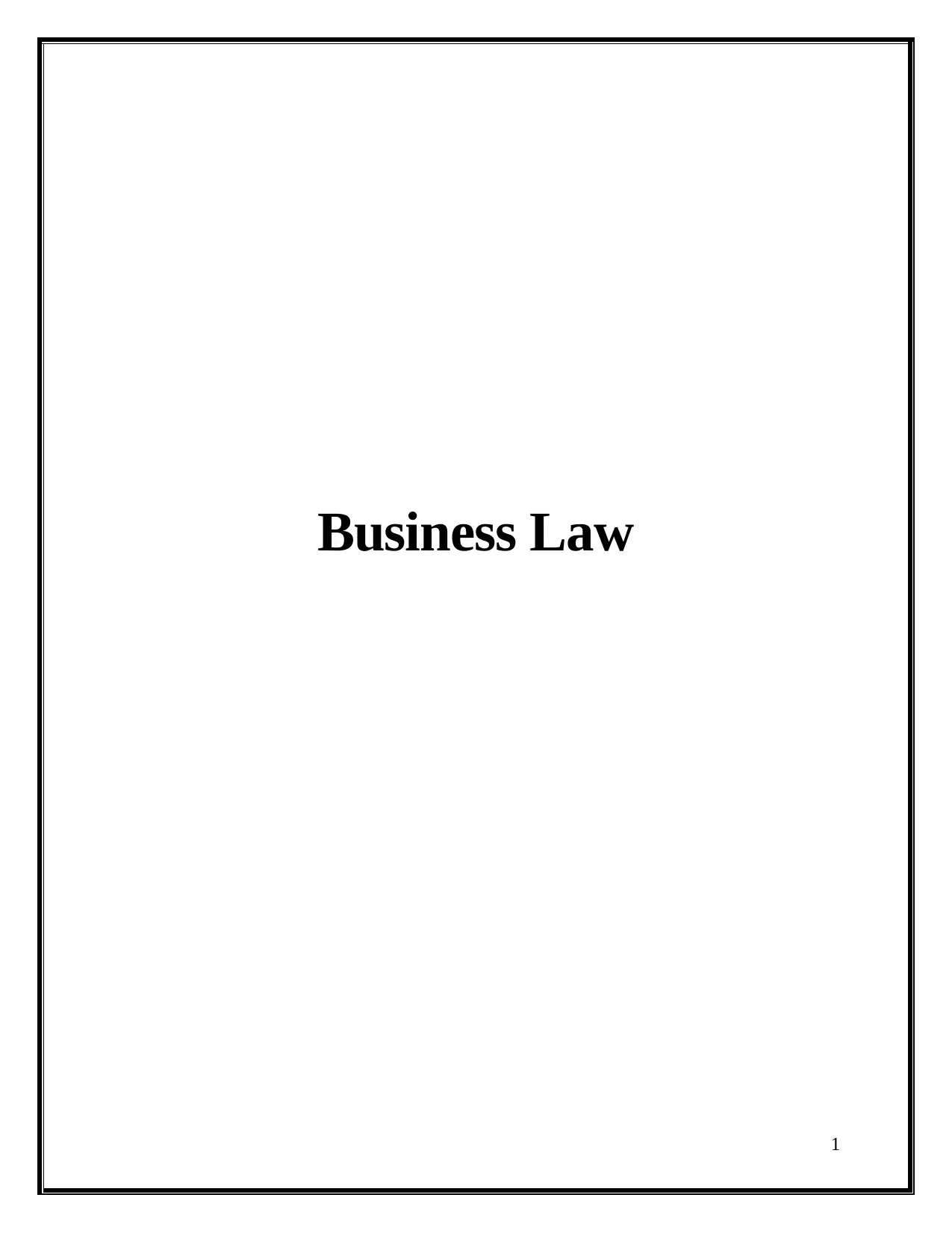
Business Law
1
1
Paraphrase This Document
Need a fresh take? Get an instant paraphrase of this document with our AI Paraphraser
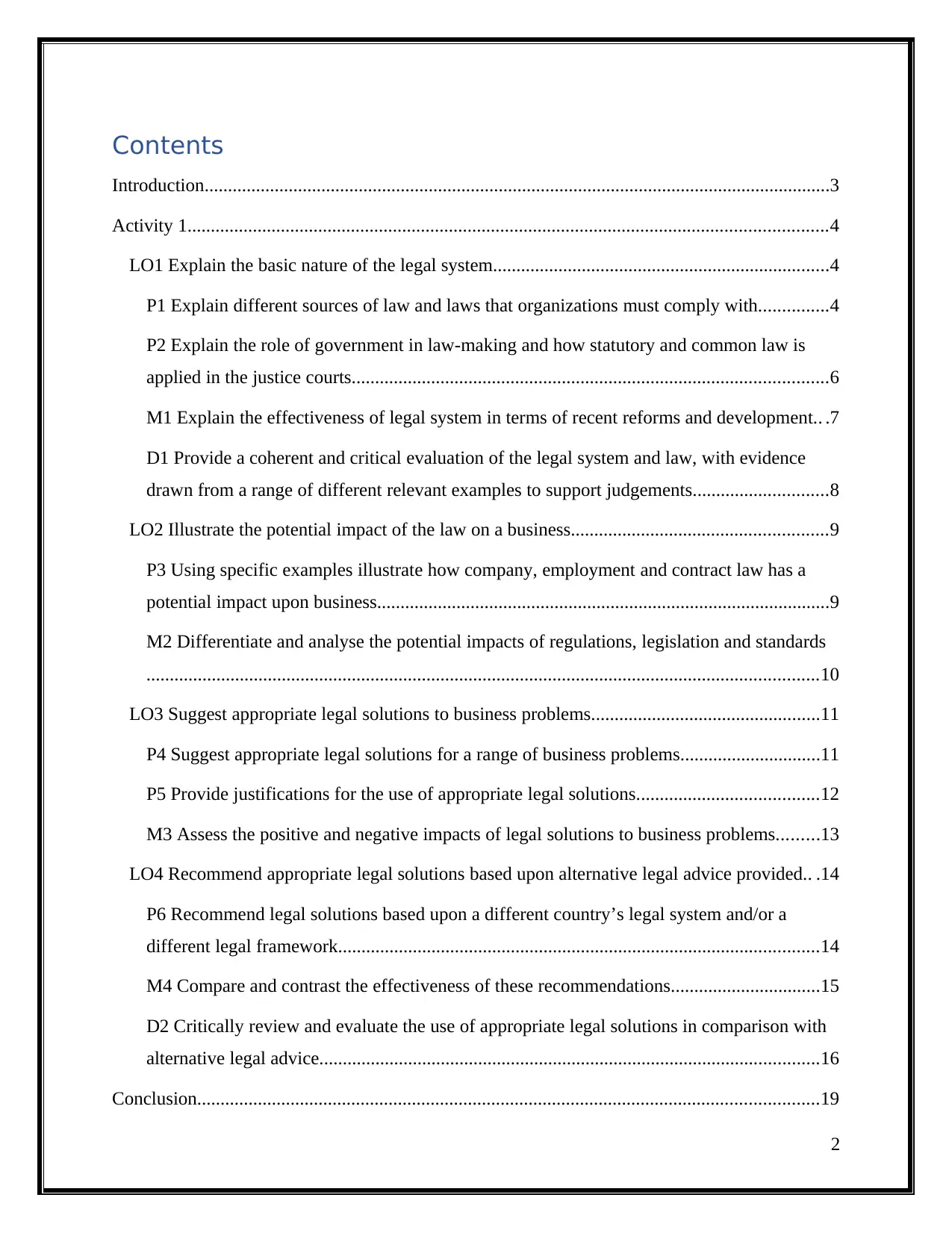
Contents
Introduction......................................................................................................................................3
Activity 1.........................................................................................................................................4
LO1 Explain the basic nature of the legal system........................................................................4
P1 Explain different sources of law and laws that organizations must comply with...............4
P2 Explain the role of government in law-making and how statutory and common law is
applied in the justice courts......................................................................................................6
M1 Explain the effectiveness of legal system in terms of recent reforms and development.. .7
D1 Provide a coherent and critical evaluation of the legal system and law, with evidence
drawn from a range of different relevant examples to support judgements.............................8
LO2 Illustrate the potential impact of the law on a business.......................................................9
P3 Using specific examples illustrate how company, employment and contract law has a
potential impact upon business.................................................................................................9
M2 Differentiate and analyse the potential impacts of regulations, legislation and standards
................................................................................................................................................10
LO3 Suggest appropriate legal solutions to business problems.................................................11
P4 Suggest appropriate legal solutions for a range of business problems..............................11
P5 Provide justifications for the use of appropriate legal solutions.......................................12
M3 Assess the positive and negative impacts of legal solutions to business problems.........13
LO4 Recommend appropriate legal solutions based upon alternative legal advice provided.. .14
P6 Recommend legal solutions based upon a different country’s legal system and/or a
different legal framework.......................................................................................................14
M4 Compare and contrast the effectiveness of these recommendations................................15
D2 Critically review and evaluate the use of appropriate legal solutions in comparison with
alternative legal advice...........................................................................................................16
Conclusion.....................................................................................................................................19
2
Introduction......................................................................................................................................3
Activity 1.........................................................................................................................................4
LO1 Explain the basic nature of the legal system........................................................................4
P1 Explain different sources of law and laws that organizations must comply with...............4
P2 Explain the role of government in law-making and how statutory and common law is
applied in the justice courts......................................................................................................6
M1 Explain the effectiveness of legal system in terms of recent reforms and development.. .7
D1 Provide a coherent and critical evaluation of the legal system and law, with evidence
drawn from a range of different relevant examples to support judgements.............................8
LO2 Illustrate the potential impact of the law on a business.......................................................9
P3 Using specific examples illustrate how company, employment and contract law has a
potential impact upon business.................................................................................................9
M2 Differentiate and analyse the potential impacts of regulations, legislation and standards
................................................................................................................................................10
LO3 Suggest appropriate legal solutions to business problems.................................................11
P4 Suggest appropriate legal solutions for a range of business problems..............................11
P5 Provide justifications for the use of appropriate legal solutions.......................................12
M3 Assess the positive and negative impacts of legal solutions to business problems.........13
LO4 Recommend appropriate legal solutions based upon alternative legal advice provided.. .14
P6 Recommend legal solutions based upon a different country’s legal system and/or a
different legal framework.......................................................................................................14
M4 Compare and contrast the effectiveness of these recommendations................................15
D2 Critically review and evaluate the use of appropriate legal solutions in comparison with
alternative legal advice...........................................................................................................16
Conclusion.....................................................................................................................................19
2

References......................................................................................................................................20
3
3
⊘ This is a preview!⊘
Do you want full access?
Subscribe today to unlock all pages.

Trusted by 1+ million students worldwide
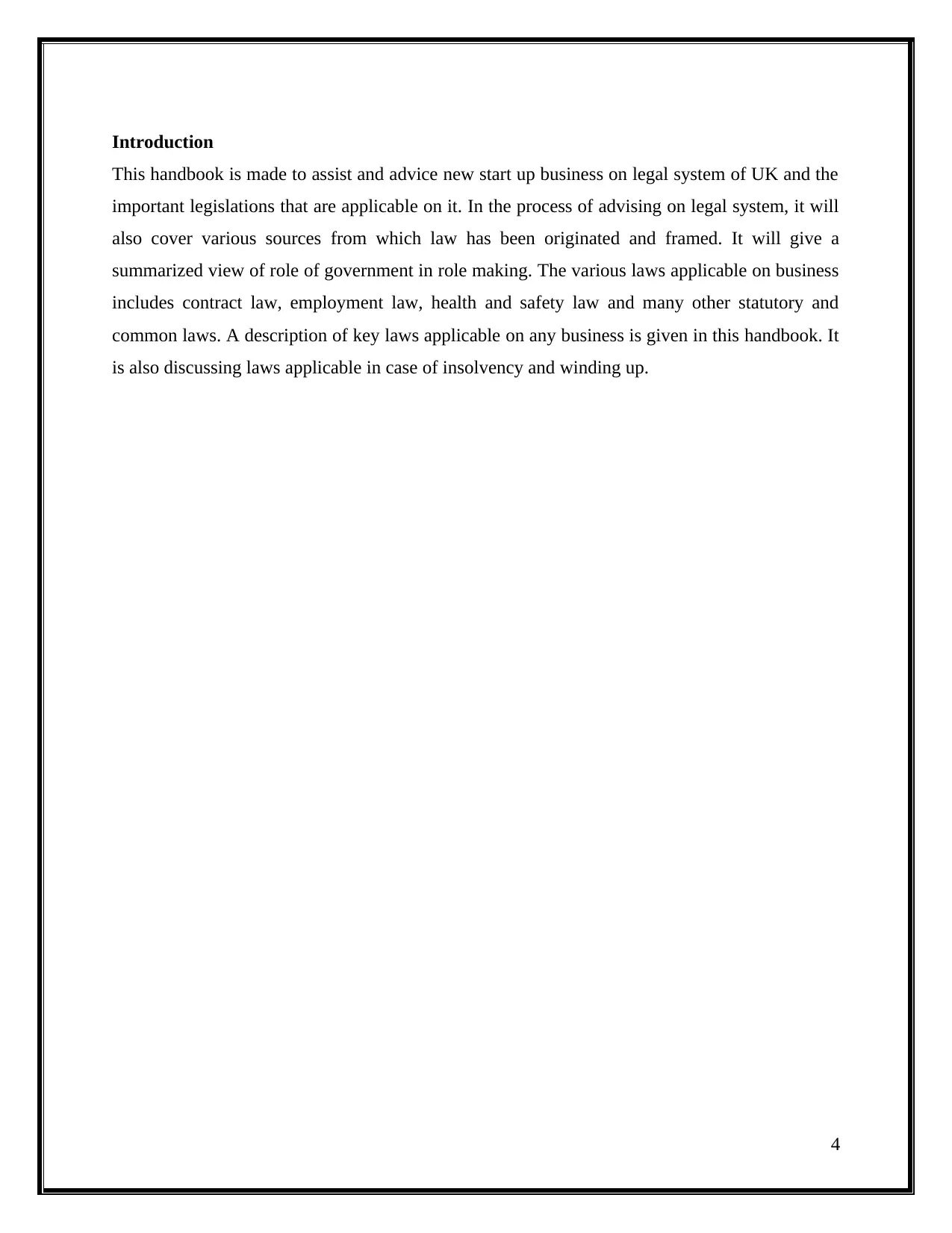
Introduction
This handbook is made to assist and advice new start up business on legal system of UK and the
important legislations that are applicable on it. In the process of advising on legal system, it will
also cover various sources from which law has been originated and framed. It will give a
summarized view of role of government in role making. The various laws applicable on business
includes contract law, employment law, health and safety law and many other statutory and
common laws. A description of key laws applicable on any business is given in this handbook. It
is also discussing laws applicable in case of insolvency and winding up.
4
This handbook is made to assist and advice new start up business on legal system of UK and the
important legislations that are applicable on it. In the process of advising on legal system, it will
also cover various sources from which law has been originated and framed. It will give a
summarized view of role of government in role making. The various laws applicable on business
includes contract law, employment law, health and safety law and many other statutory and
common laws. A description of key laws applicable on any business is given in this handbook. It
is also discussing laws applicable in case of insolvency and winding up.
4
Paraphrase This Document
Need a fresh take? Get an instant paraphrase of this document with our AI Paraphraser
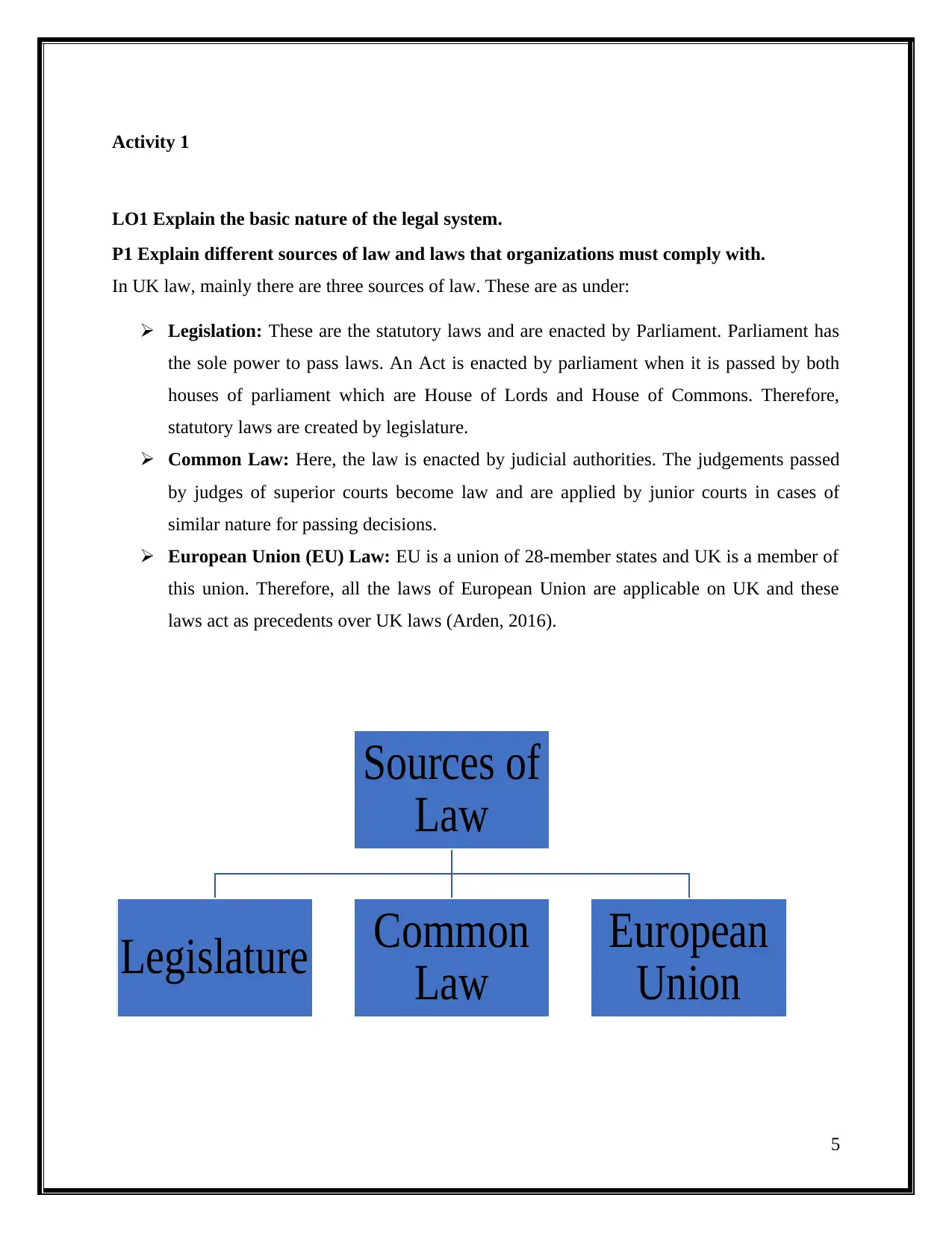
Activity 1
LO1 Explain the basic nature of the legal system.
P1 Explain different sources of law and laws that organizations must comply with.
In UK law, mainly there are three sources of law. These are as under:
Legislation: These are the statutory laws and are enacted by Parliament. Parliament has
the sole power to pass laws. An Act is enacted by parliament when it is passed by both
houses of parliament which are House of Lords and House of Commons. Therefore,
statutory laws are created by legislature.
Common Law: Here, the law is enacted by judicial authorities. The judgements passed
by judges of superior courts become law and are applied by junior courts in cases of
similar nature for passing decisions.
European Union (EU) Law: EU is a union of 28-member states and UK is a member of
this union. Therefore, all the laws of European Union are applicable on UK and these
laws act as precedents over UK laws (Arden, 2016).
5
Sources of
Law
Legislature Common
Law
European
Union
LO1 Explain the basic nature of the legal system.
P1 Explain different sources of law and laws that organizations must comply with.
In UK law, mainly there are three sources of law. These are as under:
Legislation: These are the statutory laws and are enacted by Parliament. Parliament has
the sole power to pass laws. An Act is enacted by parliament when it is passed by both
houses of parliament which are House of Lords and House of Commons. Therefore,
statutory laws are created by legislature.
Common Law: Here, the law is enacted by judicial authorities. The judgements passed
by judges of superior courts become law and are applied by junior courts in cases of
similar nature for passing decisions.
European Union (EU) Law: EU is a union of 28-member states and UK is a member of
this union. Therefore, all the laws of European Union are applicable on UK and these
laws act as precedents over UK laws (Arden, 2016).
5
Sources of
Law
Legislature Common
Law
European
Union
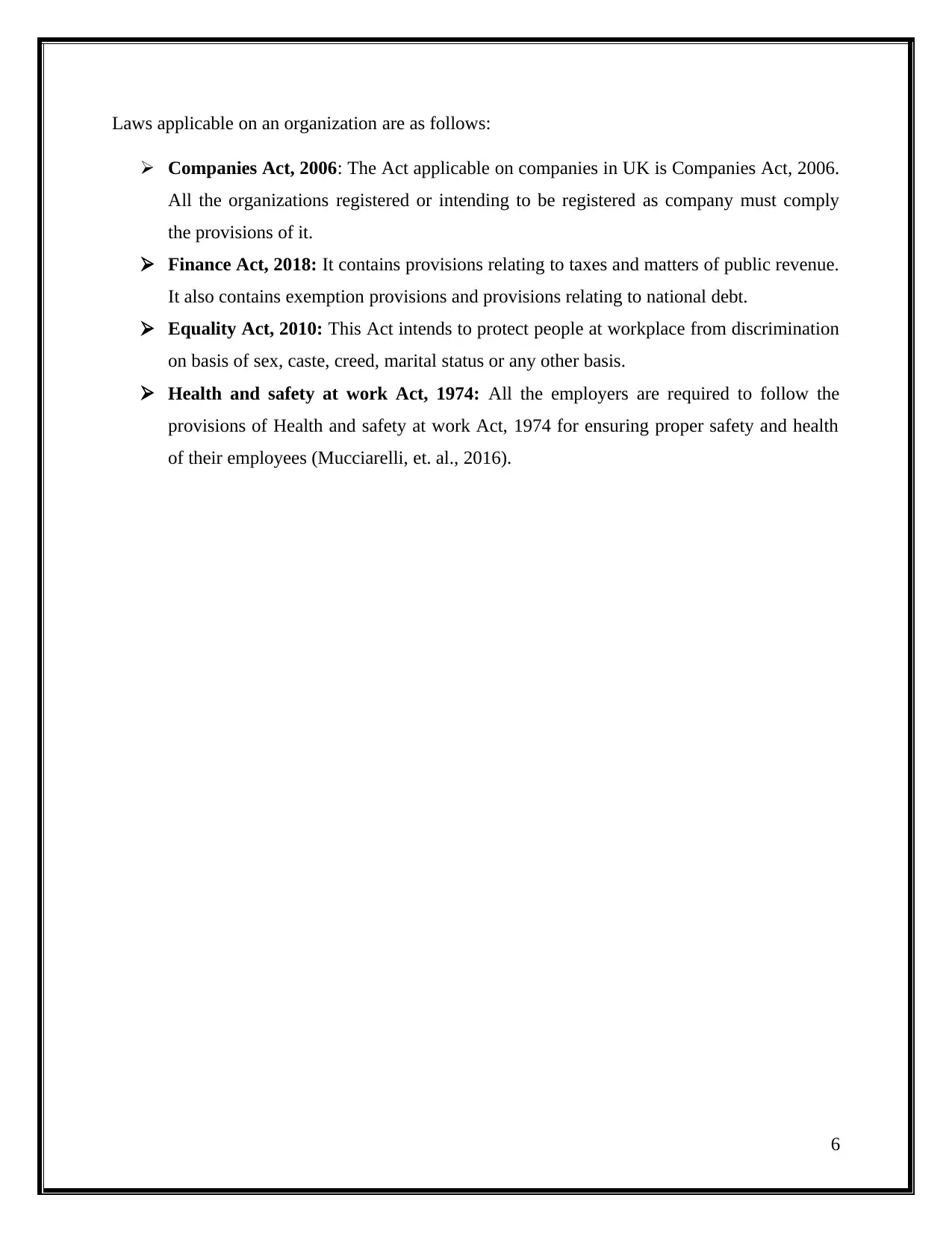
Laws applicable on an organization are as follows:
Companies Act, 2006: The Act applicable on companies in UK is Companies Act, 2006.
All the organizations registered or intending to be registered as company must comply
the provisions of it.
Finance Act, 2018: It contains provisions relating to taxes and matters of public revenue.
It also contains exemption provisions and provisions relating to national debt.
Equality Act, 2010: This Act intends to protect people at workplace from discrimination
on basis of sex, caste, creed, marital status or any other basis.
Health and safety at work Act, 1974: All the employers are required to follow the
provisions of Health and safety at work Act, 1974 for ensuring proper safety and health
of their employees (Mucciarelli, et. al., 2016).
6
Companies Act, 2006: The Act applicable on companies in UK is Companies Act, 2006.
All the organizations registered or intending to be registered as company must comply
the provisions of it.
Finance Act, 2018: It contains provisions relating to taxes and matters of public revenue.
It also contains exemption provisions and provisions relating to national debt.
Equality Act, 2010: This Act intends to protect people at workplace from discrimination
on basis of sex, caste, creed, marital status or any other basis.
Health and safety at work Act, 1974: All the employers are required to follow the
provisions of Health and safety at work Act, 1974 for ensuring proper safety and health
of their employees (Mucciarelli, et. al., 2016).
6
⊘ This is a preview!⊘
Do you want full access?
Subscribe today to unlock all pages.

Trusted by 1+ million students worldwide
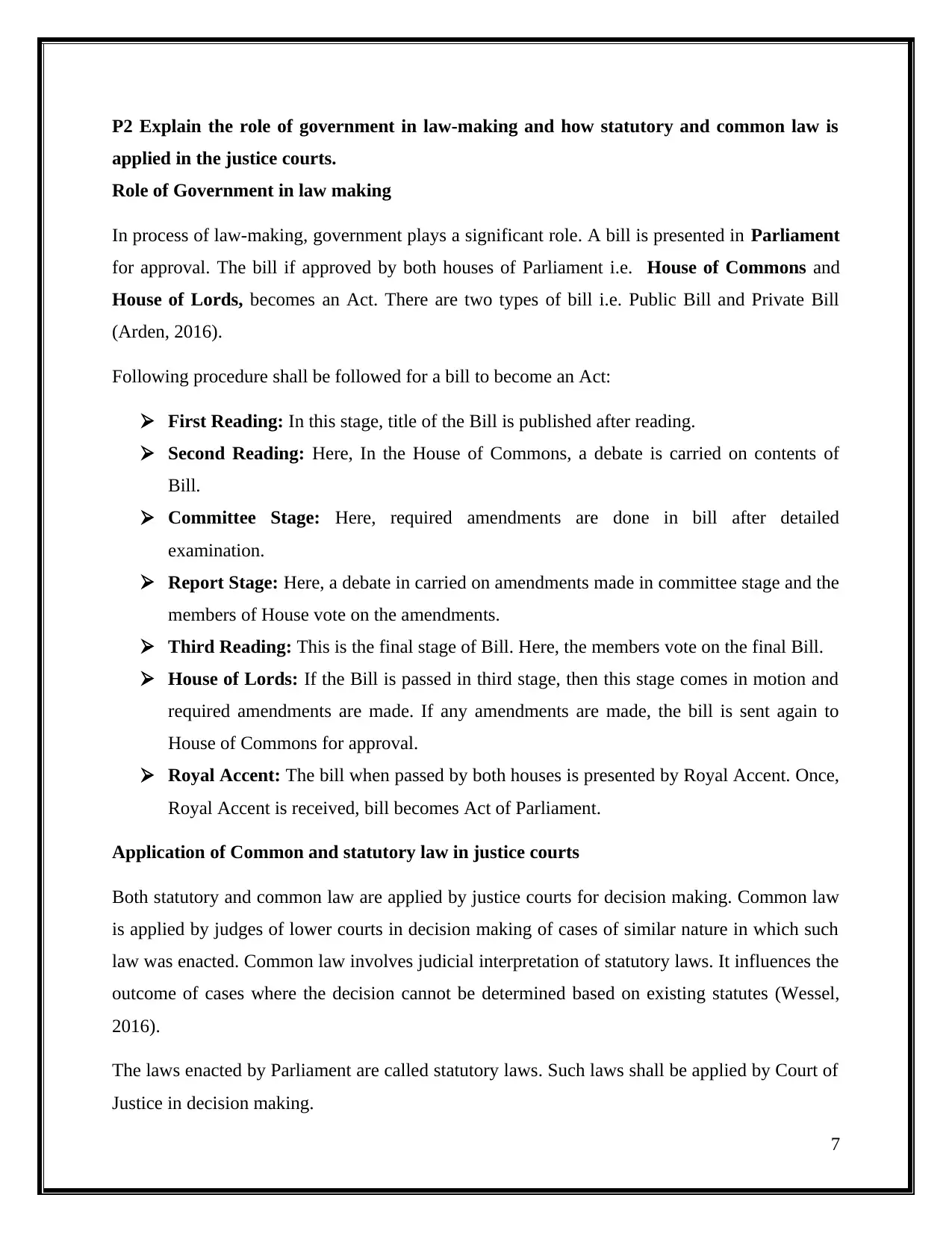
P2 Explain the role of government in law-making and how statutory and common law is
applied in the justice courts.
Role of Government in law making
In process of law-making, government plays a significant role. A bill is presented in Parliament
for approval. The bill if approved by both houses of Parliament i.e. House of Commons and
House of Lords, becomes an Act. There are two types of bill i.e. Public Bill and Private Bill
(Arden, 2016).
Following procedure shall be followed for a bill to become an Act:
First Reading: In this stage, title of the Bill is published after reading.
Second Reading: Here, In the House of Commons, a debate is carried on contents of
Bill.
Committee Stage: Here, required amendments are done in bill after detailed
examination.
Report Stage: Here, a debate in carried on amendments made in committee stage and the
members of House vote on the amendments.
Third Reading: This is the final stage of Bill. Here, the members vote on the final Bill.
House of Lords: If the Bill is passed in third stage, then this stage comes in motion and
required amendments are made. If any amendments are made, the bill is sent again to
House of Commons for approval.
Royal Accent: The bill when passed by both houses is presented by Royal Accent. Once,
Royal Accent is received, bill becomes Act of Parliament.
Application of Common and statutory law in justice courts
Both statutory and common law are applied by justice courts for decision making. Common law
is applied by judges of lower courts in decision making of cases of similar nature in which such
law was enacted. Common law involves judicial interpretation of statutory laws. It influences the
outcome of cases where the decision cannot be determined based on existing statutes (Wessel,
2016).
The laws enacted by Parliament are called statutory laws. Such laws shall be applied by Court of
Justice in decision making.
7
applied in the justice courts.
Role of Government in law making
In process of law-making, government plays a significant role. A bill is presented in Parliament
for approval. The bill if approved by both houses of Parliament i.e. House of Commons and
House of Lords, becomes an Act. There are two types of bill i.e. Public Bill and Private Bill
(Arden, 2016).
Following procedure shall be followed for a bill to become an Act:
First Reading: In this stage, title of the Bill is published after reading.
Second Reading: Here, In the House of Commons, a debate is carried on contents of
Bill.
Committee Stage: Here, required amendments are done in bill after detailed
examination.
Report Stage: Here, a debate in carried on amendments made in committee stage and the
members of House vote on the amendments.
Third Reading: This is the final stage of Bill. Here, the members vote on the final Bill.
House of Lords: If the Bill is passed in third stage, then this stage comes in motion and
required amendments are made. If any amendments are made, the bill is sent again to
House of Commons for approval.
Royal Accent: The bill when passed by both houses is presented by Royal Accent. Once,
Royal Accent is received, bill becomes Act of Parliament.
Application of Common and statutory law in justice courts
Both statutory and common law are applied by justice courts for decision making. Common law
is applied by judges of lower courts in decision making of cases of similar nature in which such
law was enacted. Common law involves judicial interpretation of statutory laws. It influences the
outcome of cases where the decision cannot be determined based on existing statutes (Wessel,
2016).
The laws enacted by Parliament are called statutory laws. Such laws shall be applied by Court of
Justice in decision making.
7
Paraphrase This Document
Need a fresh take? Get an instant paraphrase of this document with our AI Paraphraser
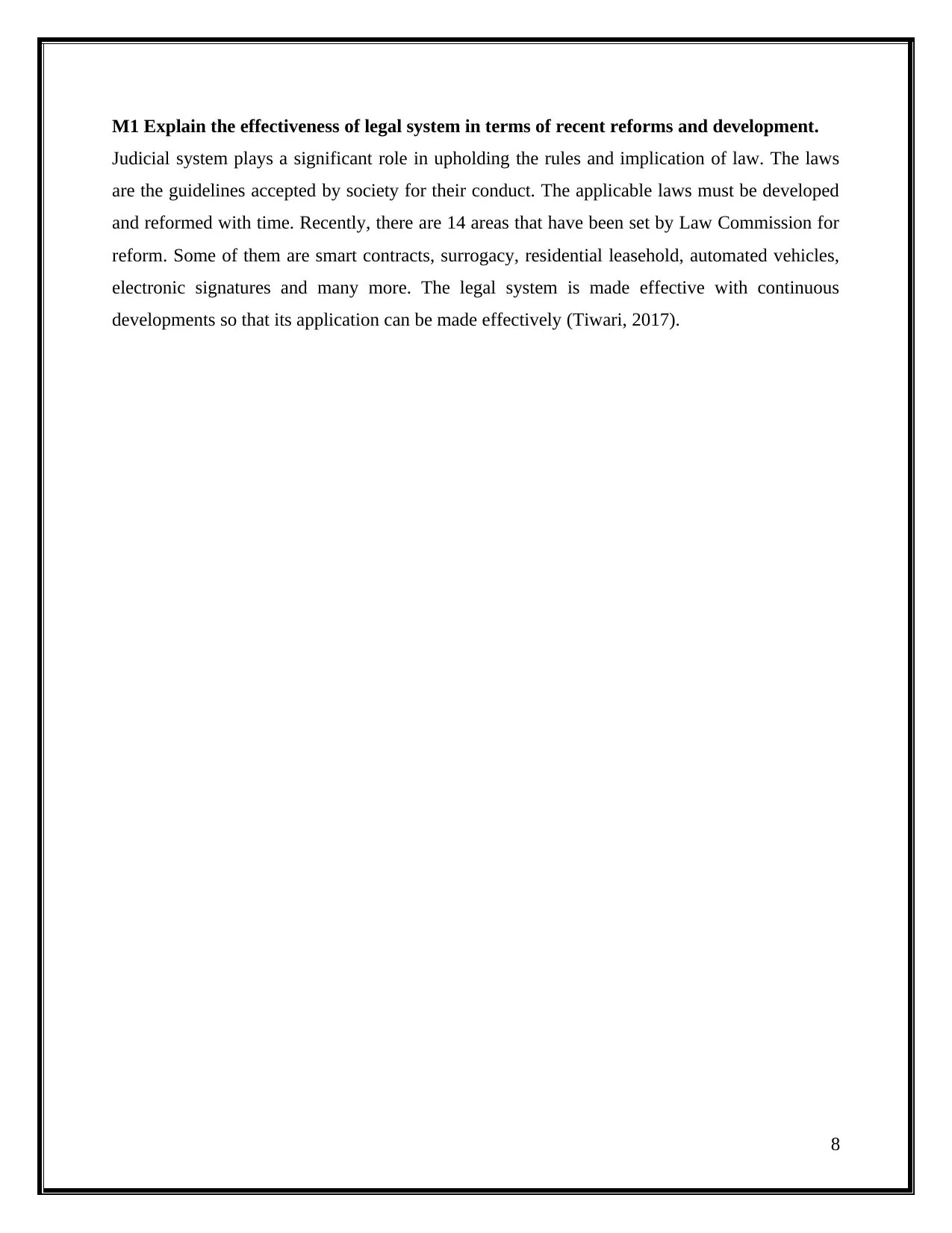
M1 Explain the effectiveness of legal system in terms of recent reforms and development.
Judicial system plays a significant role in upholding the rules and implication of law. The laws
are the guidelines accepted by society for their conduct. The applicable laws must be developed
and reformed with time. Recently, there are 14 areas that have been set by Law Commission for
reform. Some of them are smart contracts, surrogacy, residential leasehold, automated vehicles,
electronic signatures and many more. The legal system is made effective with continuous
developments so that its application can be made effectively (Tiwari, 2017).
8
Judicial system plays a significant role in upholding the rules and implication of law. The laws
are the guidelines accepted by society for their conduct. The applicable laws must be developed
and reformed with time. Recently, there are 14 areas that have been set by Law Commission for
reform. Some of them are smart contracts, surrogacy, residential leasehold, automated vehicles,
electronic signatures and many more. The legal system is made effective with continuous
developments so that its application can be made effectively (Tiwari, 2017).
8
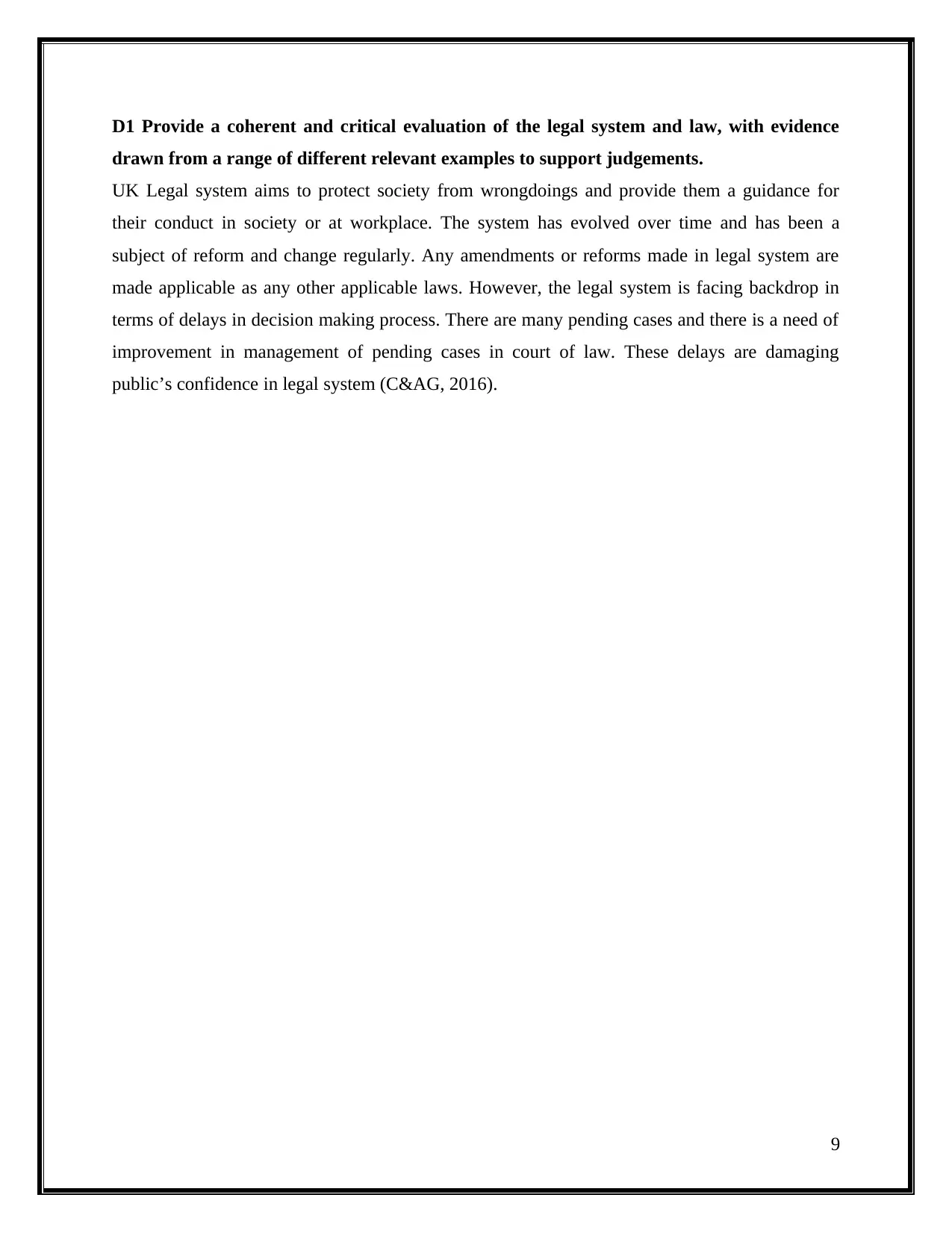
D1 Provide a coherent and critical evaluation of the legal system and law, with evidence
drawn from a range of different relevant examples to support judgements.
UK Legal system aims to protect society from wrongdoings and provide them a guidance for
their conduct in society or at workplace. The system has evolved over time and has been a
subject of reform and change regularly. Any amendments or reforms made in legal system are
made applicable as any other applicable laws. However, the legal system is facing backdrop in
terms of delays in decision making process. There are many pending cases and there is a need of
improvement in management of pending cases in court of law. These delays are damaging
public’s confidence in legal system (C&AG, 2016).
9
drawn from a range of different relevant examples to support judgements.
UK Legal system aims to protect society from wrongdoings and provide them a guidance for
their conduct in society or at workplace. The system has evolved over time and has been a
subject of reform and change regularly. Any amendments or reforms made in legal system are
made applicable as any other applicable laws. However, the legal system is facing backdrop in
terms of delays in decision making process. There are many pending cases and there is a need of
improvement in management of pending cases in court of law. These delays are damaging
public’s confidence in legal system (C&AG, 2016).
9
⊘ This is a preview!⊘
Do you want full access?
Subscribe today to unlock all pages.

Trusted by 1+ million students worldwide
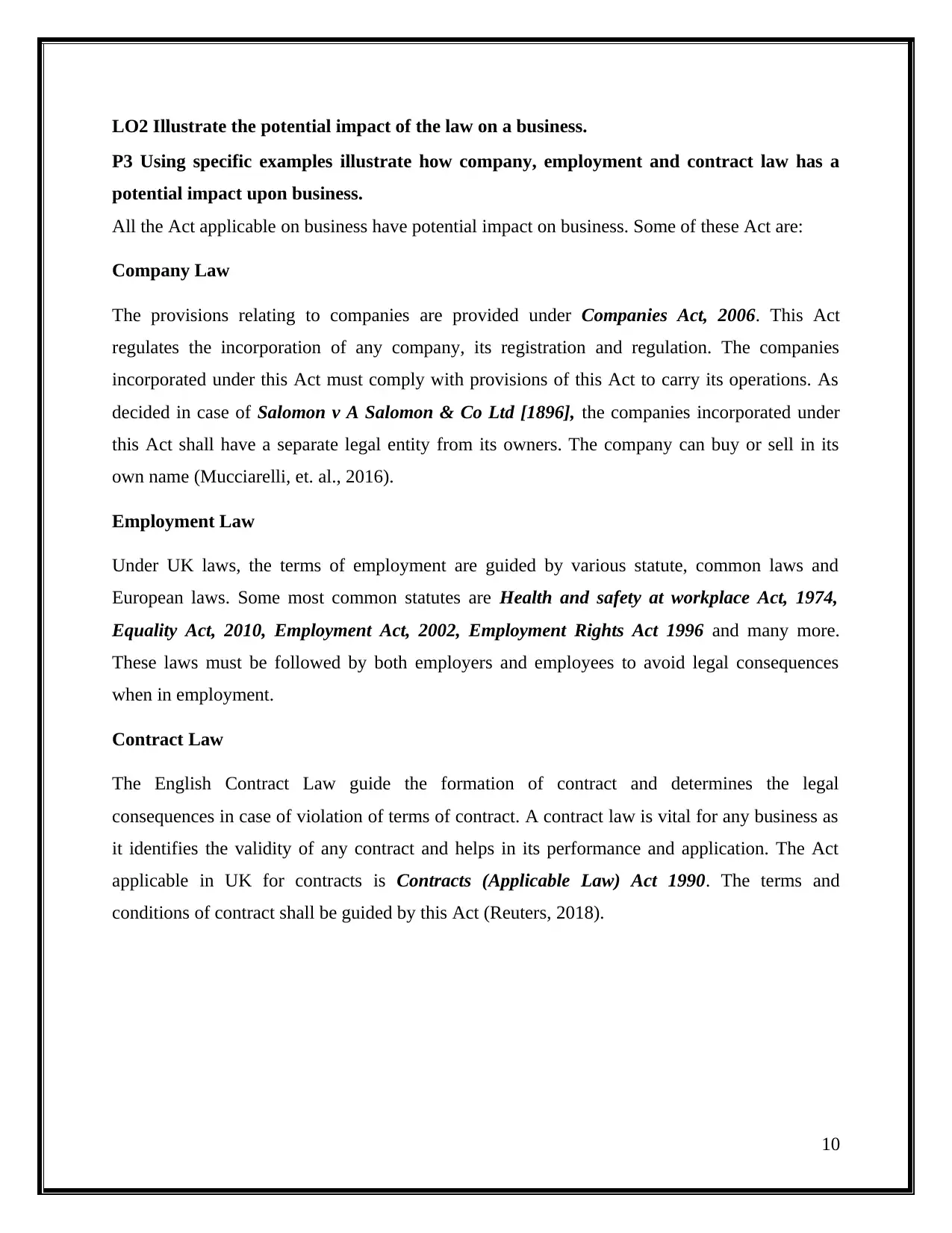
LO2 Illustrate the potential impact of the law on a business.
P3 Using specific examples illustrate how company, employment and contract law has a
potential impact upon business.
All the Act applicable on business have potential impact on business. Some of these Act are:
Company Law
The provisions relating to companies are provided under Companies Act, 2006. This Act
regulates the incorporation of any company, its registration and regulation. The companies
incorporated under this Act must comply with provisions of this Act to carry its operations. As
decided in case of Salomon v A Salomon & Co Ltd [1896], the companies incorporated under
this Act shall have a separate legal entity from its owners. The company can buy or sell in its
own name (Mucciarelli, et. al., 2016).
Employment Law
Under UK laws, the terms of employment are guided by various statute, common laws and
European laws. Some most common statutes are Health and safety at workplace Act, 1974,
Equality Act, 2010, Employment Act, 2002, Employment Rights Act 1996 and many more.
These laws must be followed by both employers and employees to avoid legal consequences
when in employment.
Contract Law
The English Contract Law guide the formation of contract and determines the legal
consequences in case of violation of terms of contract. A contract law is vital for any business as
it identifies the validity of any contract and helps in its performance and application. The Act
applicable in UK for contracts is Contracts (Applicable Law) Act 1990. The terms and
conditions of contract shall be guided by this Act (Reuters, 2018).
10
P3 Using specific examples illustrate how company, employment and contract law has a
potential impact upon business.
All the Act applicable on business have potential impact on business. Some of these Act are:
Company Law
The provisions relating to companies are provided under Companies Act, 2006. This Act
regulates the incorporation of any company, its registration and regulation. The companies
incorporated under this Act must comply with provisions of this Act to carry its operations. As
decided in case of Salomon v A Salomon & Co Ltd [1896], the companies incorporated under
this Act shall have a separate legal entity from its owners. The company can buy or sell in its
own name (Mucciarelli, et. al., 2016).
Employment Law
Under UK laws, the terms of employment are guided by various statute, common laws and
European laws. Some most common statutes are Health and safety at workplace Act, 1974,
Equality Act, 2010, Employment Act, 2002, Employment Rights Act 1996 and many more.
These laws must be followed by both employers and employees to avoid legal consequences
when in employment.
Contract Law
The English Contract Law guide the formation of contract and determines the legal
consequences in case of violation of terms of contract. A contract law is vital for any business as
it identifies the validity of any contract and helps in its performance and application. The Act
applicable in UK for contracts is Contracts (Applicable Law) Act 1990. The terms and
conditions of contract shall be guided by this Act (Reuters, 2018).
10
Paraphrase This Document
Need a fresh take? Get an instant paraphrase of this document with our AI Paraphraser
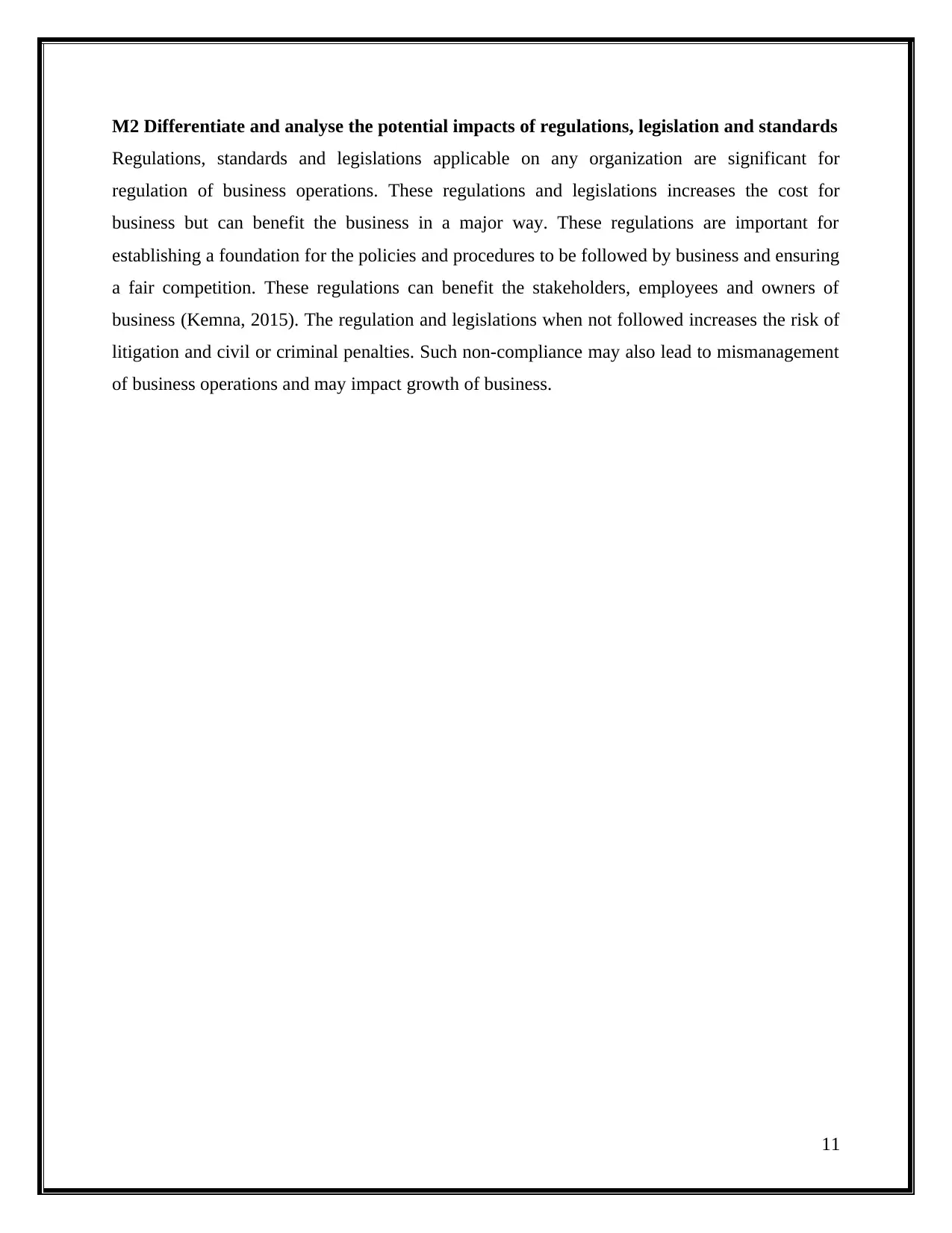
M2 Differentiate and analyse the potential impacts of regulations, legislation and standards
Regulations, standards and legislations applicable on any organization are significant for
regulation of business operations. These regulations and legislations increases the cost for
business but can benefit the business in a major way. These regulations are important for
establishing a foundation for the policies and procedures to be followed by business and ensuring
a fair competition. These regulations can benefit the stakeholders, employees and owners of
business (Kemna, 2015). The regulation and legislations when not followed increases the risk of
litigation and civil or criminal penalties. Such non-compliance may also lead to mismanagement
of business operations and may impact growth of business.
11
Regulations, standards and legislations applicable on any organization are significant for
regulation of business operations. These regulations and legislations increases the cost for
business but can benefit the business in a major way. These regulations are important for
establishing a foundation for the policies and procedures to be followed by business and ensuring
a fair competition. These regulations can benefit the stakeholders, employees and owners of
business (Kemna, 2015). The regulation and legislations when not followed increases the risk of
litigation and civil or criminal penalties. Such non-compliance may also lead to mismanagement
of business operations and may impact growth of business.
11
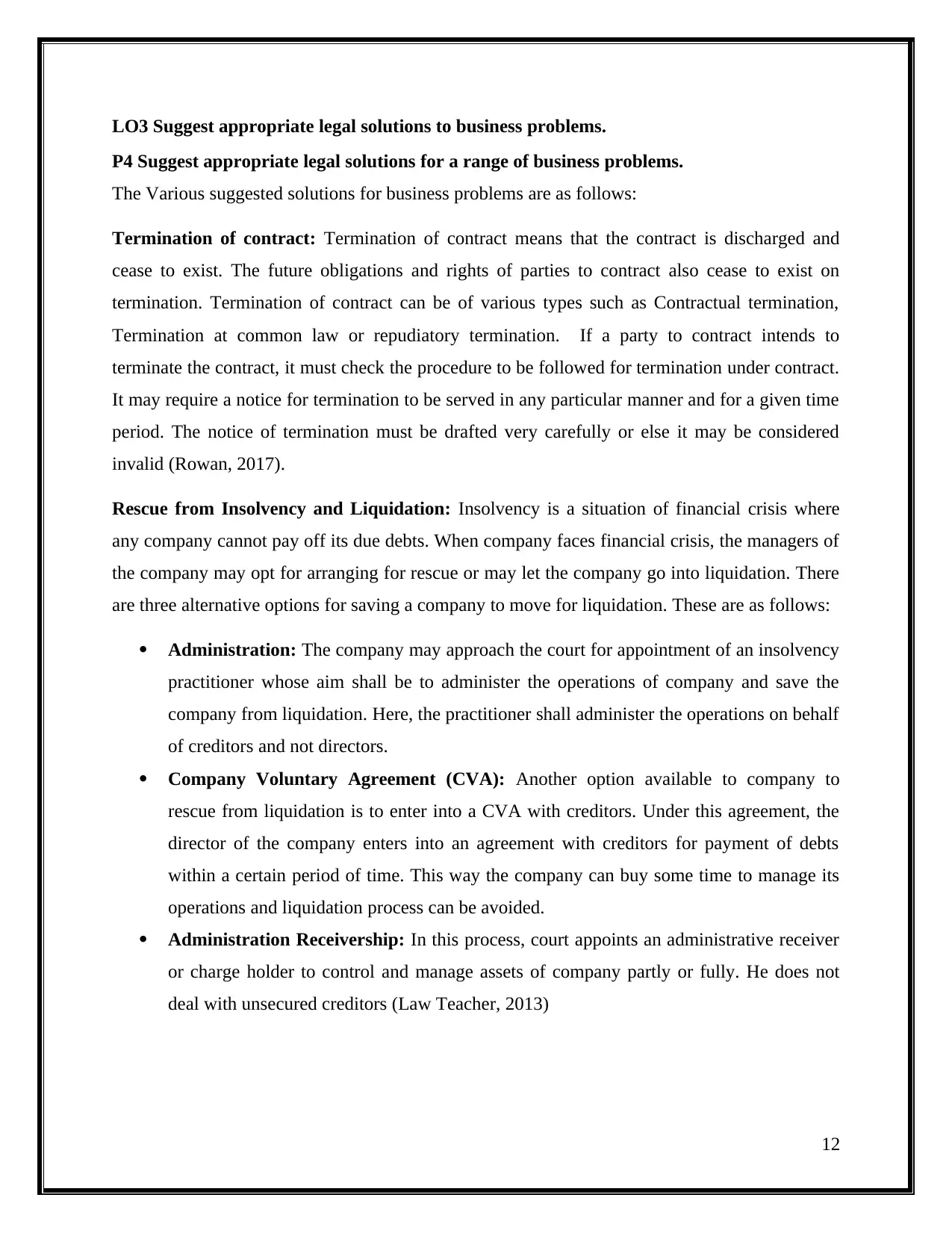
LO3 Suggest appropriate legal solutions to business problems.
P4 Suggest appropriate legal solutions for a range of business problems.
The Various suggested solutions for business problems are as follows:
Termination of contract: Termination of contract means that the contract is discharged and
cease to exist. The future obligations and rights of parties to contract also cease to exist on
termination. Termination of contract can be of various types such as Contractual termination,
Termination at common law or repudiatory termination. If a party to contract intends to
terminate the contract, it must check the procedure to be followed for termination under contract.
It may require a notice for termination to be served in any particular manner and for a given time
period. The notice of termination must be drafted very carefully or else it may be considered
invalid (Rowan, 2017).
Rescue from Insolvency and Liquidation: Insolvency is a situation of financial crisis where
any company cannot pay off its due debts. When company faces financial crisis, the managers of
the company may opt for arranging for rescue or may let the company go into liquidation. There
are three alternative options for saving a company to move for liquidation. These are as follows:
Administration: The company may approach the court for appointment of an insolvency
practitioner whose aim shall be to administer the operations of company and save the
company from liquidation. Here, the practitioner shall administer the operations on behalf
of creditors and not directors.
Company Voluntary Agreement (CVA): Another option available to company to
rescue from liquidation is to enter into a CVA with creditors. Under this agreement, the
director of the company enters into an agreement with creditors for payment of debts
within a certain period of time. This way the company can buy some time to manage its
operations and liquidation process can be avoided.
Administration Receivership: In this process, court appoints an administrative receiver
or charge holder to control and manage assets of company partly or fully. He does not
deal with unsecured creditors (Law Teacher, 2013)
12
P4 Suggest appropriate legal solutions for a range of business problems.
The Various suggested solutions for business problems are as follows:
Termination of contract: Termination of contract means that the contract is discharged and
cease to exist. The future obligations and rights of parties to contract also cease to exist on
termination. Termination of contract can be of various types such as Contractual termination,
Termination at common law or repudiatory termination. If a party to contract intends to
terminate the contract, it must check the procedure to be followed for termination under contract.
It may require a notice for termination to be served in any particular manner and for a given time
period. The notice of termination must be drafted very carefully or else it may be considered
invalid (Rowan, 2017).
Rescue from Insolvency and Liquidation: Insolvency is a situation of financial crisis where
any company cannot pay off its due debts. When company faces financial crisis, the managers of
the company may opt for arranging for rescue or may let the company go into liquidation. There
are three alternative options for saving a company to move for liquidation. These are as follows:
Administration: The company may approach the court for appointment of an insolvency
practitioner whose aim shall be to administer the operations of company and save the
company from liquidation. Here, the practitioner shall administer the operations on behalf
of creditors and not directors.
Company Voluntary Agreement (CVA): Another option available to company to
rescue from liquidation is to enter into a CVA with creditors. Under this agreement, the
director of the company enters into an agreement with creditors for payment of debts
within a certain period of time. This way the company can buy some time to manage its
operations and liquidation process can be avoided.
Administration Receivership: In this process, court appoints an administrative receiver
or charge holder to control and manage assets of company partly or fully. He does not
deal with unsecured creditors (Law Teacher, 2013)
12
⊘ This is a preview!⊘
Do you want full access?
Subscribe today to unlock all pages.

Trusted by 1+ million students worldwide
1 out of 22
Related Documents
Your All-in-One AI-Powered Toolkit for Academic Success.
+13062052269
info@desklib.com
Available 24*7 on WhatsApp / Email
![[object Object]](/_next/static/media/star-bottom.7253800d.svg)
Unlock your academic potential
Copyright © 2020–2026 A2Z Services. All Rights Reserved. Developed and managed by ZUCOL.





